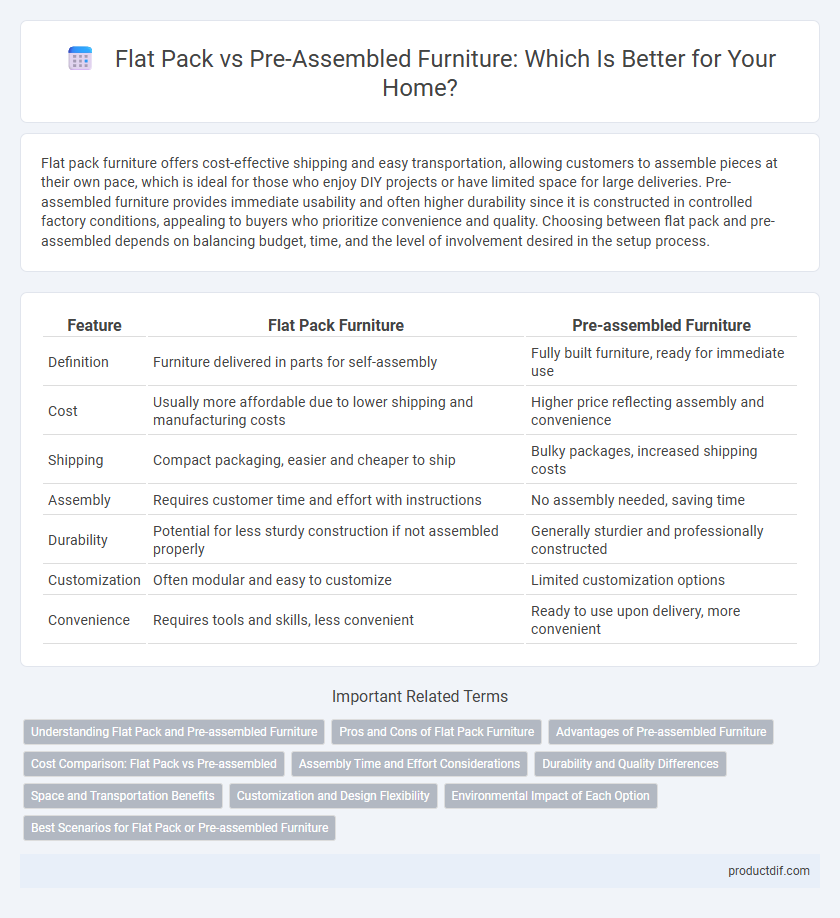Flat pack furniture offers cost-effective shipping and easy transportation, allowing customers to assemble pieces at their own pace, which is ideal for those who enjoy DIY projects or have limited space for large deliveries. Pre-assembled furniture provides immediate usability and often higher durability since it is constructed in controlled factory conditions, appealing to buyers who prioritize convenience and quality. Choosing between flat pack and pre-assembled depends on balancing budget, time, and the level of involvement desired in the setup process.
Table of Comparison
| Feature | Flat Pack Furniture | Pre-assembled Furniture |
|---|---|---|
| Definition | Furniture delivered in parts for self-assembly | Fully built furniture, ready for immediate use |
| Cost | Usually more affordable due to lower shipping and manufacturing costs | Higher price reflecting assembly and convenience |
| Shipping | Compact packaging, easier and cheaper to ship | Bulky packages, increased shipping costs |
| Assembly | Requires customer time and effort with instructions | No assembly needed, saving time |
| Durability | Potential for less sturdy construction if not assembled properly | Generally sturdier and professionally constructed |
| Customization | Often modular and easy to customize | Limited customization options |
| Convenience | Requires tools and skills, less convenient | Ready to use upon delivery, more convenient |
Understanding Flat Pack and Pre-assembled Furniture
Flat pack furniture consists of components packaged in a compact box requiring customer assembly, offering affordability and ease of transport. Pre-assembled furniture arrives fully constructed, providing immediate usability and often higher durability due to professional assembly. Choosing between flat pack and pre-assembled furniture depends on factors like budget, space, and time availability for setup.
Pros and Cons of Flat Pack Furniture
Flat pack furniture offers the advantage of cost-effectiveness and easy transportation due to its compact packaging, making it ideal for budget-conscious buyers and those with limited storage space. However, flat pack assembly often requires time, patience, and basic DIY skills, which can be challenging for individuals unfamiliar with tools or complex instructions. The potential for missing parts or incorrect assembly may affect durability, whereas pre-assembled furniture provides immediate usability but usually at a higher price and larger shipping footprint.
Advantages of Pre-assembled Furniture
Pre-assembled furniture offers immediate usability, eliminating the time and effort required for assembly. It typically ensures higher structural integrity and durability since it is constructed by professionals under controlled conditions. This option reduces the risk of missing parts or assembly errors, providing a hassle-free setup experience.
Cost Comparison: Flat Pack vs Pre-assembled
Flat pack furniture offers significant cost savings due to lower manufacturing and shipping expenses, making it a budget-friendly option for consumers. Pre-assembled furniture, while generally more expensive, includes added value such as convenience and time savings, often justifying the higher price. Evaluating the total cost should consider not only the purchase price but also factors like assembly time, potential tools needed, and shipping fees.
Assembly Time and Effort Considerations
Flat pack furniture requires more assembly time and effort due to the need for manual construction from individual components, often involving detailed instructions and tools. Pre-assembled furniture significantly reduces setup time, as it arrives ready to use, minimizing physical labor and complexity. Choosing between the two depends on the buyer's preference for convenience versus cost savings and willingness to engage in hands-on assembly.
Durability and Quality Differences
Flat pack furniture often compromises durability and quality due to mass-produced components and the need for easy assembly, which can result in weaker joints and less robust materials. Pre-assembled furniture typically offers superior craftsmanship and sturdier construction, using higher-grade materials and professional assembly techniques that enhance long-term durability. Customers seeking lasting quality and strength usually prefer pre-assembled options despite higher costs, while flat pack suits those prioritizing affordability and convenience.
Space and Transportation Benefits
Flat pack furniture optimizes space by allowing compact packaging, making it easier to store and transport compared to bulky pre-assembled pieces. This efficient packaging reduces shipping costs and environmental impact by maximizing load capacity in vehicles. Consumers benefit from convenient handling and flexibility during moves or deliveries, enhancing overall logistics efficiency.
Customization and Design Flexibility
Flat pack furniture offers superior customization options, allowing consumers to select individual components, finishes, and configurations tailored to specific interior designs. Pre-assembled furniture typically provides limited design flexibility, as pieces come in fixed styles and dimensions with minimal modification possibilities. Choosing flat pack solutions supports personalized decor schemes and adaptive spatial planning, essential for dynamic living environments.
Environmental Impact of Each Option
Flat pack furniture significantly reduces carbon emissions due to compact packaging that optimizes transportation efficiency and minimizes storage space. Pre-assembled furniture often involves bulkier shipments, increasing fuel consumption and contributing to a larger carbon footprint. Choosing flat pack options supports sustainable practices by lowering transportation-related environmental impacts and waste.
Best Scenarios for Flat Pack or Pre-assembled Furniture
Flat pack furniture is ideal for consumers seeking budget-friendly, space-saving options with convenient transport and easy storage, particularly suited for those comfortable with DIY assembly or frequently relocating. Pre-assembled furniture suits buyers prioritizing immediate usability, high build quality, and time-saving, making it perfect for individuals lacking assembly skills or in need of fully functional pieces upon delivery. Both options cater to distinct needs, with flat pack excelling in affordability and flexibility, while pre-assembled delivers convenience and durability.
Flat Pack vs Pre-assembled Infographic

 productdif.com
productdif.com